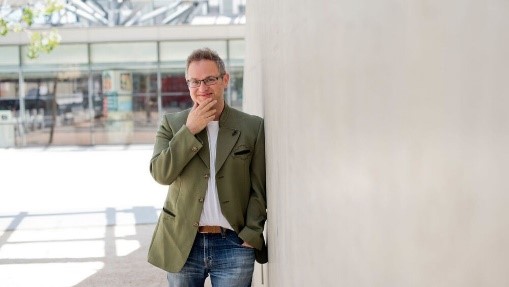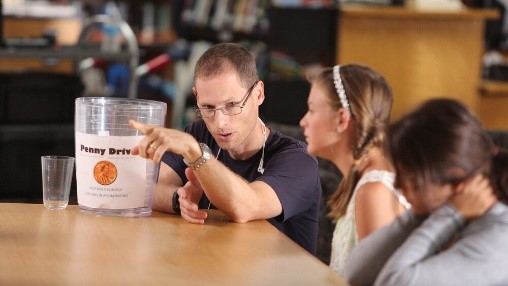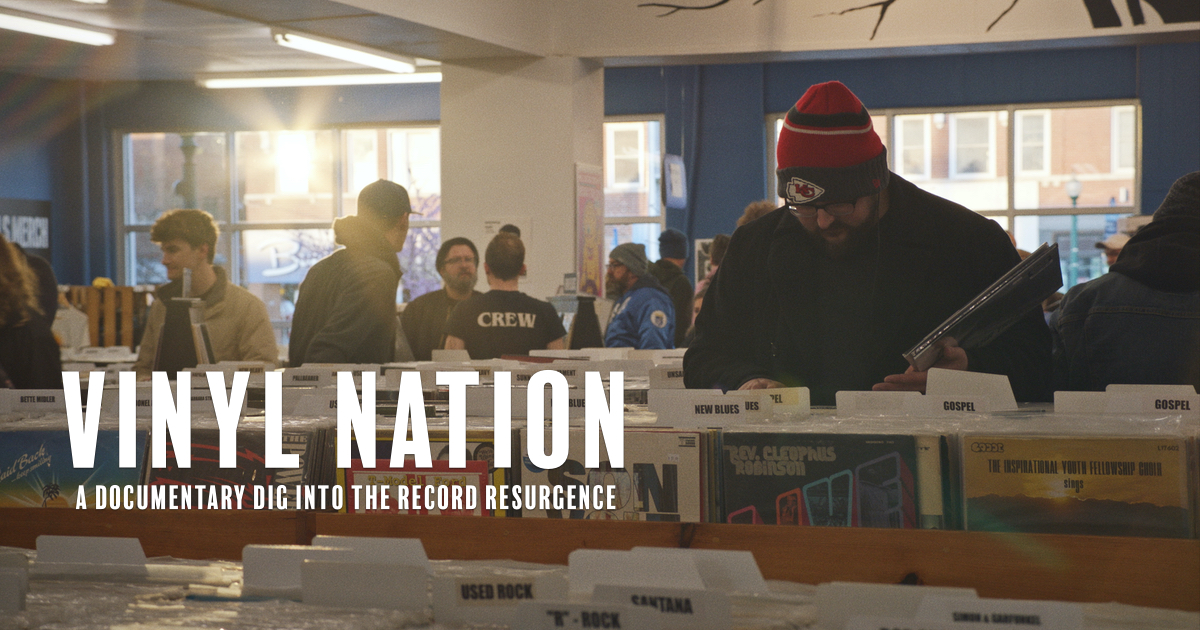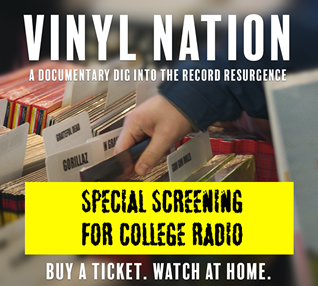By Dave Sarkies
When Kevin Smokler and Christopher Boone, the filmmakers behind the documentary Vinyl Nation, contacted College Radio Day about partnering with us on our big day next week, it was a perfect fit. What better platform for two guys all about music discovery who just made a movie about the record resurgence to promote their film than college radio? Kevin and Chris spoke with us by phone recently to give their thoughts on college radio and tell us how this exciting partnership came about.
What are your thoughts on college radio in general and CRD as an event?

Kevin: I went to graduate school in Austin, then ended up in the Bay Area, home of legendary college radio stations like KVRX at UT Austin and KALX at UC Berkeley, respectively, so I’ve been a fan of college radio for years. When the streaming era began, I realized I didn’t have to live near a college to get college radio; it was like living a musical fantasy.
What’s interesting about listening to music you’ve never heard is someone else’s enthusiasm for it. Nigerian Polka music may not be your thing, but it’s more likely to become your thing if someone is crazy enthusiastic about it. Enthusiasm is contagious.
For example, I didn’t know I had any place in my life for Zydeco music – I didn’t even know what it was – then I ended up in Austin. On Tuesdays there was a show on KVRX with some kid from Louisiana who would play Zydeco music. I was like, “Good God! Where’s Zydeco music been my whole life? This is amazing!” It’s just because this kid worked in college radio and was crazy about it.
There are a lot of different magical things about college radio but seeing the world through a young person’s musical eyes is the one that jumps out at me.
Chris: I have limited experience with college radio but my roommate my sophomore year was one of the DJs at our college station. I don’t know how it happened, but he was like “You should come down and do a show with me.” So, I did. I can’t tell you a thing I played but I’m sure I thought I was playing deep cuts. I thought it was cool.
I remember at that time that college radio was where you discovered new music. I remember the Breeders. They were so big on college radio, and for whatever reason, it took forever for them to cross over to even alternative radio. But they were huge on college radio at the time. I always thought that was fascinating, how things would bubble up.
Kevin: As far as College Radio Day, I think it’s awesome there’s a day to recognize the contributions of college radio. Among those who have worked in college radio and gone on to be DJs or people in the music industry, there’s a trend of posting old shows on SoundCloud. Oliver Wang, who’s in our movie and is now a Professor of Sociology and Music History, was a DJ on KALX when he was at Berkeley. He’s posted a bunch of his old KALX programs from 30 years ago. The guy had as good of musical taste then as he does now! It’s amazing to hear someone now in his mid-40s spinning records from back then and talking about the music of the day.
Why did you decide to give 50% of the proceeds of the virtual cinema release of Vinyl Nation to College Radio Day?
Chris: We’re reaching out to partners we think would have an affinity for our movie, like record stores, arthouse cinemas, and music venues, and College Radio Day popped up on our radar because of Vinylthon, which coincides with Record Store Day. We thought if we could do something with College Radio Day it would really be great. So, we connected with Rob Quicke and he thought it was something that would work really well.
We want to make sure that organizations that support vinyl records and the fans that love vinyl records are also able to raise funds through our virtual cinema release. That’s essentially how the partnership came to be. We decided it made sense to focus our efforts around our movie right around College Radio Day, Friday, October 2nd, and the whole weekend – the 2nd through the 4th – so stations can promote the film and help raise money for the organization by selling tickets. We found it to be a nice tie-in, and we’re excited to be a part of it.
Do you guys expect to do another promotion of the film around Vinylthon?
Kevin: If you will have us, then certainly. (laughs)
We work with organizations who can speak to their members all at once. Of course, we have to show them we’ve got a quality piece of cinema and they can trust Chris and I as people. But yeah, we’d like to come back for Vinylthon, it sounds perfect for us. We’d like to do something just as crazy as we do for College Radio Day, which is essentially spend all day leapfrogging from station to station until we pass out. I’ve told Rob I would like an honorary Golden Slipmat when this all said and done. I consider that as good as an Oscar at this point! (laughs)

Why do you think the vinyl resurgence happen, and why do you think Record Store Day has been such a success?
Chris: I think it was a confluence of different factors that happened around the same time. Records started to come back in 2007, and the iPhone dropped at the same time. Everyone began to realize “Wow, it’s super convenient to have all my music with me!” You could transfer from the iPod to the iPhone, and smartphones started to take off, but I think people started to realize they were missing something. They were missing the tangible aspect of music. At first it was like, “This is so convenient!”, but they weren’t connecting with music in the same way.
Record stores were hurting and going out of business because of iTunes. People were done even buying CDs. So, record store owners got together and discussed the idea of doing something similar to Comic Book Day, and that was the beginning of Record Store Day.
Around the same time, Crosley began partnering with retailers to bring colorful, inexpensive turntables into stores that appealed to young people. People needed music to play on their turntables, so bands started releasing music on vinyl.
Kevin: Around the same time, Mad Men came out, which influenced an entire movement towards mid-century America, and what’s more mid-century America than a turntable? It created an appetite for retroactive technology.
Chris and I came to this story much, much later. The comeback of vinyl was a decade old by the time we got to it, so we were convinced Vinyl Nation wasn’t going to be an answer to that question. It was more “What does it mean that it happened?” We basically let the people in the movie debate that.
But record stores essentially said, “We need a reason for people to come in and buy music, and CDs aren’t enough.” Vinyl was their only hope, and it’s kind of amazing it worked. But I think if that confluence of things hadn’t occurred at the same time, it probably wouldn’t have happened.
Like Kevin and Chris, we’re glad it did. Much like college radio, there is something about vinyl that makes the experience of discovering music more special. Whether you’re tuning in to a show you listen to regularly or just flipping the dial and coming across something great that you’ve never heard before, the excitement is tangible – like a record! – and hard to match.
And now you can purchase a ticket to watch the virtual cinema release of Vinyl Nation and support the College Radio Foundation at the same time! 50% of your ticket proceeds will go to the College Radio Foundation. Get your ticket to Vinyl Nation to support the College Radio Foundation here. Then tune in for more vinyl music discovery via the college radio airwaves, Friday, October 2nd, for College Radio Day!





